Your Hens NEED Oyster Shells!
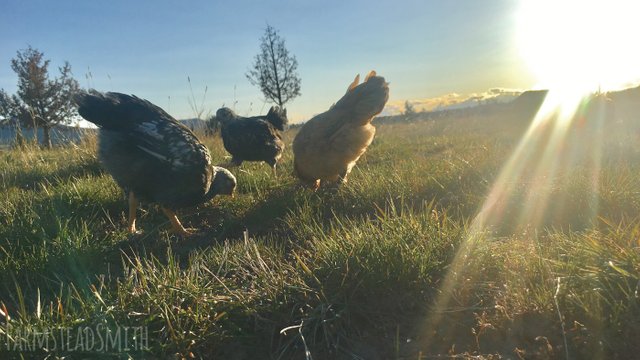
Some people don't, but I am of the belief that you should always provide your poultry with the option of Grit and Oyster Shells - it is better to be safe than sorry! If they don't need it, they won't eat it!
Yesterday I talked about the importance of providing grit for your chickens, and I mentioned I would do a post today about the importance of providing your hens with Oyster Shells as a calcium supplement***.

Your hen uses up a ton of calcium in the 18-20 hours it takes for her to develop the eggshell. The egg shell is made up of 94%-97% calcium carbonate. That's a lot! As you can imagine, that depletes the chicken's stores of calcium for themselves. If a chicken does not have enough calcium to spare to create an egg, she starts taking it from her own resources - which leads to brittle bones that are easy to fracture.
The eggshell for each egg that your hen lays is about 95% calcium carbonate by dry weight. In just one year’s time, the amount of calcium that a hen will put into her eggshells can equal 20 times the amount of calcium that is contained in her bones. That’s a lot of calcium. In order to stay healthy and produce strong egg shells, she needs to consume a steady supply of calcium. (McMurray Hatchery)
It would also be good to note that a hen's calcium needs will fluctuate throughout her lifetime based on age and even the weather! Typically the calcium needs increase in hot weather and as she ages. It is also important to feed supplemental calcium if your laying hen eats anything other than complete laying hen feed. She will need more calcium if she is foraging, enjoying scratch, or treats.
Other than affecting their bones, not having enough calcium will affect their eggs! They can lay eggs that have either a very thin and brittle shell, or even no shell at all! Eggs without a shell are often called Soft Shelled or Shell-less eggs. And they're weird! One of my hen's first** egg was a shell-less! Man, it was weird! I'm gonna do a post about it, but here's a pic!
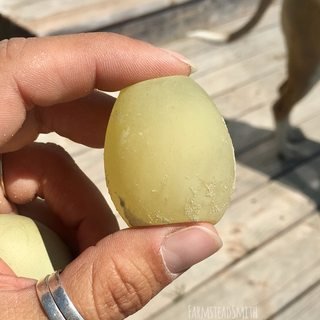
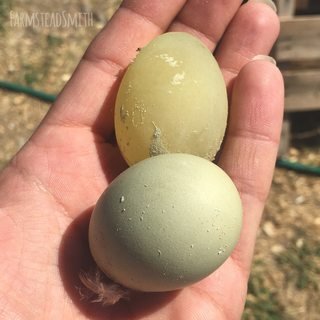
You can see above the soft egg on the left, and then in the image on the right is a hard egg (in front) with the soft egg behind.
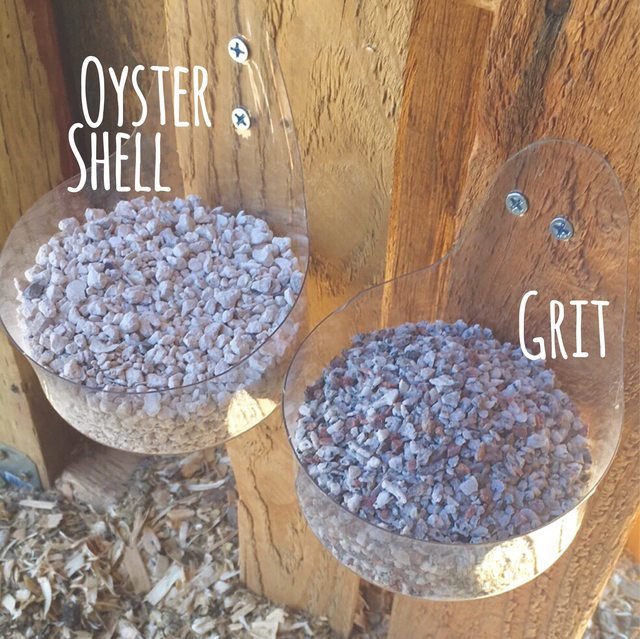
Some believe that giving cooked crushed eggshells back to your hens replaces or is just as good as giving them oyster shell as a supplement. Unfortunately it is not. It is fine to give along with the oyster shell but not enough on its own.
You can cook your eggshells in the oven at 350f for about 10 minutes. This cooks off any bad bacterias the shell may harbor. Once cooked you must crush the eggshells down into pieces that do not look like eggs/egg shells. Some refuse to give crushed eggshells as a supplement in fear it will create an egg eating hen and other sources say not to give it at all in fear it might give their chickens Salmonella. Whether or not you decide to feed eggshells back to your hens is a decision for you to make on your own with additional research. I know a lot of people who do feed eggshells back to their chickens without problems.
So why risk it? Your hens might need it! Either they'll eat it or they don't! It's not something that goes bad, thank goodness. It will be really good for them for you to add it to their diet by offering it free choice along side their feed and grit.
* The average chicken will do fine on a well rounded high quality feed made for laying hens, however, this does not account for the chickens that are outside of the average range. Some chickens will need more or less calcium - just like you and I. Some people need to supplement calcium, and some don't.
** Sometimes when hens first start laying they will lay shell-less eggs when they're body is getting used to laying.
*** Limestone is also used for calcium supplementation. I haven't seen it around me, but I am sure it's there if I look. I actually did not know this and figured it out while doing research today.
Note: I have read some sources that say not to put the supplemental calcium into the feed since not all of your chickens (roosters and chickens who are not laying) need the extra calcium. You should provide your supplemental calcium in a separate dish, the chickens who need it will take as much as they need, instinctively, while the ones who do not need it, won't touch it.
Check out my most recent Steemit Posts.
- Homesteading is Important to Me...
- #FollowFriday
- One Month Steem-a-versary! 400 Followers! (nearly)
- On Getting Caught Up in Drama
- Super Simple Tacos [Recipe]
- Your Chickens NEED Grit! [DIY Dispenser]
Blog Series
- Nature on the Farmstead - These posts will be educational and informative about the nature that happens on my farmstead. Look forward to posts about wild animals, birds, wildflowers and plants, insects, and more!
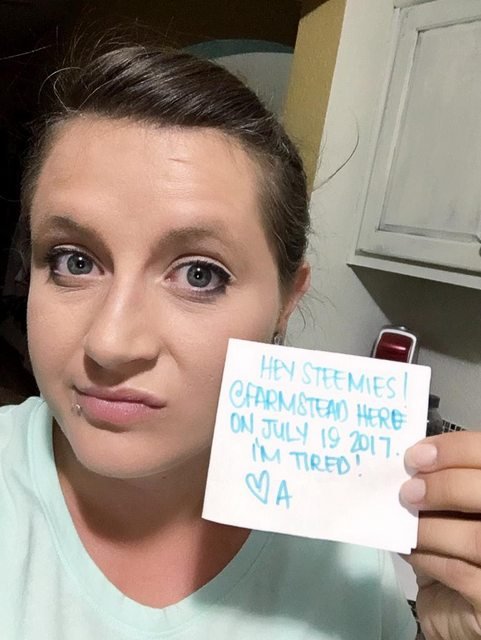
Photos by me using my iPhone 6s, unless stated otherwise!
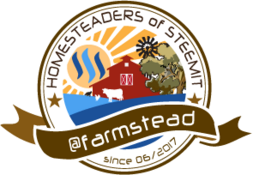

Badges by @daddykirbs and @allforthegood!
Just be sure no one in the family or your customers (if you sell your eggs) is allergic to seafood! One of my customers didn't tell me she's allergic and she got very very sick. Just a heads up! Glad to see you still steemin on🌻
Wow really?! I knew corn could affect people with a corn allergy, had no idea about oyster shell! Crazy!! I guess limestone would be the next option if hat were to happen!
I was just doing some research on this, and found it very odd!
Most sources say that it is highly unlikely to transfer any of the actual oyster shellfish allergens to the oyster's shell and then to the inside of the egg. Especially since what the shell is made up of is calcium carbonate. The person should have only had a reaction if they came into contact/are fleshy bits or juices of the oyster.
Also, I read that commercial egg production places probably use oyster shell as a supplement also (or they probably feed a "complete" layer feed which would more than likely have that in it). I wonder if that person has a problem with store eggs also, Or maybe it was a coincidence and she came into contact with seafood elsewhere.
I have never heard of this being a problem before ever, so I f ind it quite interesting!
Lots of people in who live by the coast in Australia use the big chalky calcium rich cuttlebone from cuttlefish - which are kinda like squid/octopus - the cuttlebone wash up on the beach and are easy to find. The birds love them! Might not be as easy to find inland thou!
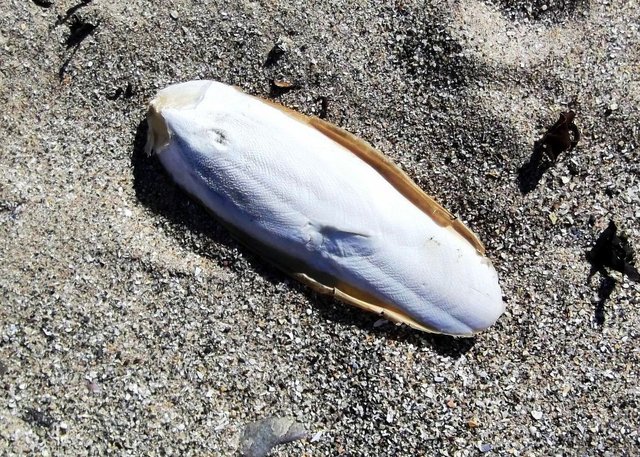
No definitely not. Haha :) thanks for sharing!
It could have been that the hen scratched around in the shell then touched the egg. I have pastured chickens so I had never used shell before. She got sick the very week I used it. Shes so allergic, she cant even go to the beach because seaweed might touch her! Its a rare case, but better to beware first. Now I ask all my customers and friends.
Hello fellow homesteader I followed you this is a great post, I live in Bulgaria originally from england and I am in the very early stages of my homestead, next year we plan to have pigs, chickens and a lamb. I look foward to your future posts and I have upvoted your post.
That's amazing! I'm glad you found me!! I'm just a beginner too! We just got our property in December 2016! I'll go check you out!!
Why did you move to Bulgaria from England if you don't mind me asking?
Many reasons I bought a house outright here no mortgage or rent the cost of living is way less than England. Proper seasons many things really.
Nice! We were looking at settling in the U.K. in the future but I don't think it's going to be compatible with what we want to do
I agree homesteading is not really much of a thing in the UK its more just left to ordinary farmers, plus the size of a decent small holding can be super expensive. Maybe consider other european countries perhaps??
I was mostly interested because I want to restore an old building and the ones in the U.K. are amazing, plus I'm terrible at foreign languages :/ I feel like that would make it difficult. I think I came up with a compromise though. We're going to stay in the U.S. and build our own house in the future and I'm going to take features from the old buildings and put them in our house!
I got a bellyRub and this post has received a 0.57 % upvote from @bellyrub thanks to: @zeartul.
Thanks!!
Yep seen plenty of this. Gotta have the grit and oyster shell, it makes a difference!
hmm so if you make a dish with chocolate chips your hen could produce chocolate eggs :)
Hmmmmm lol not sure that's how it works! Lol
I'm with you... I prefer to give my hens the option of supplements. :) We never went the route of re-using shells for the hens, it was easier to put those in the compost bin. But, it is neat to read how to do it. Thanks!
I don't think I'll do it myself... we will see. So far, no urge to go they that process. Seems like a bit of a pain. Lol
I am new to chicken keeping, so about 80% of my information comes from books, haha! I have been steering clear of the oyster shell for my tiny free-range flock because I've heard that it can be really high in mercury (since it's from the ocean and oysters can bioaccumulate toxins in substrates). What's your take on that?
At the moment, I'm feeding my chickens back their egg shells (crushed up, so that they can't recognize them). I also find that my layers eat a fair amount of critters while they forage (lizards, mice, and the like). Do you think they hunt them down for the calcium in their bones?
So excited to have other people who are sharing this life to bounce ideas off of! All my old city friends have never kept a chicken, so we've become more a conversational oddity than a legitimate discussion on how to take care of them.
From my reading yesterday, they say eggshells are not enough calcium. If you're worried about the mercury, then I would try and find the limestone.
I believe they hunt critters for their tasty meat. Hehe probably not much else going thru their head.
Not sure really about the mercury, and hadn't heard of that being a big problem. Where'd you read that? Not sure the mercury would transfer to the shells as much as much as the oyster itself.
We are lucky enough to live near some of the best oysters in the world. We go out and collect fresh bushels right out of the salt marsh. We feast every winter during oyster season and then crush the shells for the chickens all year long!
Wow that's really cool!! Do you have to do anything special with the shells? Just let them dry up and crush them? Do you have to wash or bake them??
I never heard of a soft shell or shell-less egg; very interesting. And for the chickens to know exactly how much calcium they need or don't need? Nature never ceases to amaze me.
It's pretty great that they just instinctively know, huh?? I bet we USED to know what we needed at some point, before they started messing with the food. Haha.